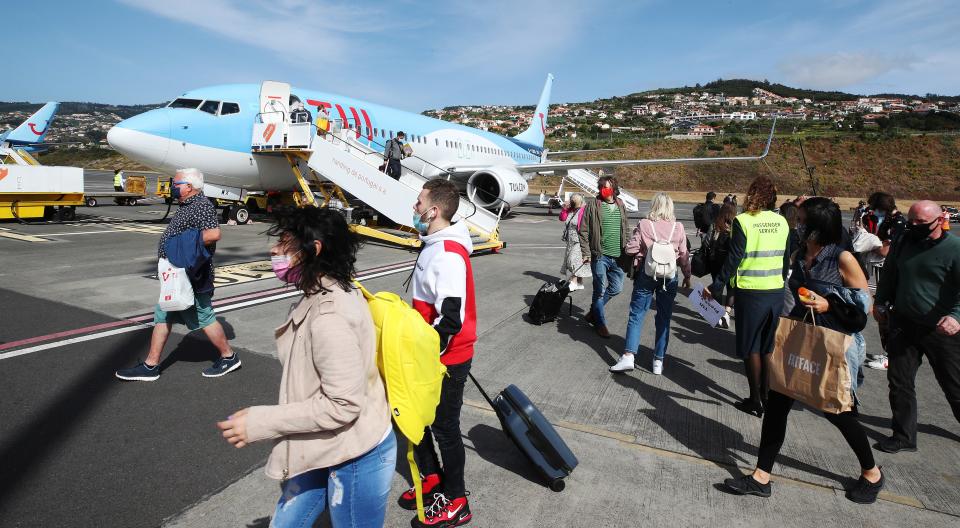Britons scramble to cancel holidays after Portugal moved to amber list as hopes for summer getaways fade

Britons have been scrambling to cancel holidays to Portugal after it was removed from the travel green list, as hopes of a summer getaway for many began to fade.
Tourists who had made it abroad are rushing to make plans to travel home before 4am next Tuesday to avoid having to quarantine for ten days. Airlines and tour operators began to lay on extra flights.
Travel bosses are facing “another lost summer” after Portugal was added to the amber travel list just weeks after the holiday hotspot reopened for British tourists.
Transport Secretary Grant Shapps blamed the move on “a sort of Nepal mutation of the so-called Indian variant” having been detected, and an increased test positivity rate in the country.
The news comes as it was revealed that the variant first identified in India is now the dominant Covid strain in the UK.
Portugal, including the islands of Madeira and the Azores, will be removed from the green list which exempts the need to quarantine on return from 4am on Tuesday, meaning travellers will be required to self-isolate for 10 days at home.
The travel industry have reacted with dismay at Thursday’s announcement, which also confirmed that no additional countries will move on to the green list for the time being, despite speculation that popular destinations such as some Spanish and Greek islands could be added.
Heathrow boss John Holland-Kaye has accused the Government of “all but guaranteeing another lost summer for the travel sector”.
He said: “If the Government is serious about protecting UK jobs and supporting businesses across the country, rapid action is needed to reopen flights to key trading partners, remove testing for vaccinated passengers from ‘green’ countries, and slash the cost and complexity of testing, as other G7 countries are doing.”
As holidaymakers in Portugal face a scramble to secure flights back to the UK before the quarantine rules come into force, Portugal questioned the “logic” of the decision.
Soon after the changes were revealed, the account of the cabinet of Portugal’s Minister of State for Foreign Affairs tweeted in English: “We take note of the British decision to remove Portugal from the travel ‘green list’, the logic of which we cannot understand.
“Portugal continues to carry out its prudent and gradual deconfinement plan, with clear rules for the safety of those who live here and those who visit us.”
In an interview, Mr Shapps said: “I want to be straight with people, it’s actually a difficult decision to make, but in the end we’ve seen two things really which caused concern.
“One is the positivity rate has nearly doubled since the last review in Portugal and the other is there’s a sort of Nepal mutation of the so-called Indian variant which has been detected and we just don’t know the potential for that to be vaccine-defeating mutation and simply don’t want to take the risk as we come up to June 21 and the review of the fourth stage of the unlock.”
A total of 12,431 cases of the Indian variant, also known as the Delta variant, have been confirmed in the UK up to June 2, according to Public Health England (PHE), which is up 79% from the previous week’s total of 6,959.
Dr Jeff Barrett, director of the Covid-19 Genomics Initiative at the Wellcome Sanger Institute, said the Nepal mutation (B.1.617.2 with an additional mutation: K417N) of the variant first detected in India (B.1.617.2), has also been observed in other variants including the one first identified in South Africa.
New data also suggests that people who have had the Pfizer vaccine have lower antibody levels against the Delta variant compared to others previously circulating in the UK.
The new laboratory data from the Francis Crick Institute and the National Institute for Health Research (NIHR) UCLH Biomedical Research Centre also suggests the levels of these antibodies are lower with increasing age and that levels decline over time.
Portugal is not the only country that has moved on the traffic light rating system.
Afghanistan, Bahrain, Costa Rica, Sudan, and Trinidad and Tobago will also be placed on the red list, meaning people arriving in the UK from those nations will be required to stay in a quarantine hotel for 11 nights.
People returning to the UK from red-list locations must stay in a quarantine hotel at a cost of £1,750 for solo travellers.
Thursday also saw the highest single-day figure of new lab-confirmed cases of coronavirus cases since March, with a further 5,274 recorded in the UK.
Read More
Holidaymakers in Portugal charged hundreds of pounds to beat quarantine deadline
Woman’s hopes of family reunion ‘crushed’ by Portugal rule change

 Yahoo News
Yahoo News 

